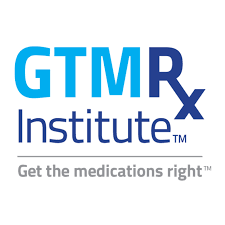
The COVID-19 pandemic and the opioid crisis have both shined a light on the increasing need for disparate health care groups to align around the same mission — starting with how medications are prescribed, managed and used.
TYSONS CORNER, Va. (PRWEB)
March 15, 2022
Today, The Get the Medications Right™ (GTMRx) Institute, the catalyst for change to medication management that brings together critical stakeholders across health care, is sharing multidisciplinary insights from key supporters about how health care can evolve to better serve patients. The GTMRx Institute boasts a membership of close to 1,600 health care, business and consumer leaders, who advocate for the broad adoption of CMM, a more rational process of care in which physicians and clinical pharmacists work together to ensure that each medication is appropriate for the patient, effective for their medical condition, safe given the patient’s health status and other medications and able to be taken by the patient as intended.
“The COVID-19 pandemic and the opioid crisis have both shined a light on the increasing need for disparate health care groups to align around the same mission — starting with how medications are prescribed, managed and used,” said Katherine H. Capps, co-founder and executive director of The GTMRx Institute. “The issues facing our health care system transcend medication management, however, and are really about an interprofessional team treating the whole patient for better care and outcomes. Our impressive group of members are focused on sharing perspective and ideas for how to address challenges and improve the system as a whole.”
A recent GTMRx study of more than 200 health care leaders — including health care providers, hospital/health system executives, payors, advocacy groups and academics found that 45% are not confident at all that our health care system will move toward a person-centered, comprehensive and integrated care within the next 3 years. And nearly half of health care leaders surveyed believe a lack of communication between prescribers (i.e. physicians, specialists, other prescribers) and pharmacists will continue to be the biggest issue in managing medications in the year ahead.
Notable GTMRx Institute members and leaders from a variety of health care fields are sharing their top takeaways for what the industry should be focused on in the year ahead.
-
Elizabeth Helms, Director, Chronic Care Policy Alliance; President & CEO, California Chronic Care Coalition says the patient needs to be part of the care team. “The patient should be recognized as a full member of the integrated team and be a part of developing their own medication plan. As far as I’m concerned, the worst-case scenario is developing a care plan without active patient participation and then presenting it to the patient as a fait accompli. We’re living the worst case scenario: That’s exactly what’s happening now in most care settings. The year ahead should be about integrating patients into their own medication plan.” - Michael Hochman, MD primary care physician and CEO of Healthcare in Action, SCAN’s Homeless Medical Group initiative says collaboration is key. “Collaborative practice agreements, using clinical pharmacists, who are right there in the community and know the patients. And specifically with homeless patients, I think there does need to be a little more outreach, the clinical pharmacist going out, through collaborative practice agreements, and seeing patients, and helping us manage their complex needs. And because it is of course, a little challenging to expect homeless patients to visit clinics. But I’ll say this, they’re much more likely to respond if you meet them in the community rather than a traditional medical office practice.”
- Steven Chen, PharmD Associate Dean for Clinical Affairs School of Pharmacy and Professor of Clinical Pharmacy at the University of Southern California School of Pharmacy, says follow up is critical. “Delivering value-based health care requires thoughtful coordination and follow up, where patients are carefully managed to ensure successful attainment of treatment goals. This is best achieved through a multidisciplinary approach involving everyone from clinical pharmacists, physicians, other health care team members, and patients with care coordination that leverages the expertise of every team member. For almost every chronic disease, optimal medication therapy is required for control: The right medications at the right doses with engaged patients and their caregivers who understand their medical conditions, how their medications help, and how to self-manage both drug and non-drug therapies.”
- Karen van Caulil, PhD President and CEO of Florida Alliance for Healthcare Value says employers need to evolve their health plans: “Employers are always looking for ways to drive value in health care for the plans they manage and for their employees. In order to achieve this, employers should be focused on implementing more innovative, comprehensive solutions that take into account the totality of the individual — moving from focusing on the pill to the patient care process. Current approaches are largely piecemeal, failing to address the appropriate use of medications and employees have recognized that there’s a better way to address health plans and medication management within it. A recent GTMRx survey of more than 300 HR leaders found that 87% of respondents believe their company would benefit from a more innovative way to manage medication therapy problems and more than nine in 10 say offering a medication expert and/or clinical pharmacist would be helpful in better understanding medications.”
GTMRx regularly releases data on CMM and insights from industry leaders — for more information, visit https://gtmr.org/learning-center/.
About the Get the Medications Right™ Institute
The GTMRx Institute is a catalyst for change that brings critical stakeholders together, bound by the urgent need to get the medications right. We are physicians, pharmacists, nurses, patients, health IT innovators, drug and diagnostics companies, consumer groups, employers, payers—aligned to save lives and save money through comprehensive medication management. By showcasing evidence and innovation, we motivate practice transformation and push payment and policy reform. Together, we ACT to champion appropriate, effective, safe and precise use of medication and gene therapies. Learn more at gtmr.org.
Share article on social media or email:

